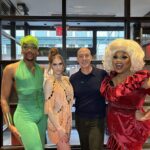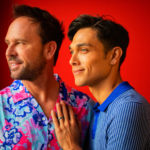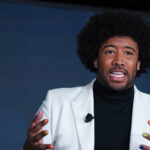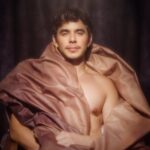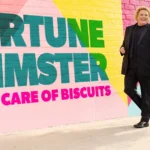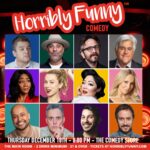Cheyenne Jackson is a true Renaissance man in the entertainment world and beyond. He has mastered the spotlight on stage and on screen, in activism and in family life. Breaking boundaries and overcoming queer stereotypes, he is the go-to leading man. On stage, he has mastered classics like Damn Yankees, West Side Story, Finian’s Rainbow, and Once Upon A Mattress, to more contemporary works like Into the Woods and The Secret Garden, to fresh pieces like Altar Boyz, All Shook Up, and, of course, Xanadu. For his solo voice, he has sold out Carnegie Hall twice, released three studio albums, and continues to spring up at venues across the nation. On screen, he has appeared in hard-hitting films like United 93, The Green, and Behind the Candelabra, with a television career that dances between genres with notable roles on 30 Rock, Glee, Curb Your Enthusiasm, American Horror Story, Call Me Kat, Disney’s Descendants, and on reality TV for The Masked Singer and RuPaul’s Drag Race…and the list goes on. Not bad for a queer kid who grew up in a small mill town, lightyears from entertainment’s bright lights.
Cheyenne was raised in Oldtown, Idaho, in a home that had an outhouse and no running water. With three siblings, his mother was his first source of musical inspiration and instruction. Without the noise of a big city, music was his constant.
Well, I will say that both my Mom and Dad were huge music lovers, and our house continuously had music playing on the record player – lots of folks, Bob Dylan, Joni Mitchell, Joan Baez, and everything in between. But in terms of singing, yes, definitely my Mom. She loved to sing and still does. The first thing that pops into my head is my ability to sing harmonies. I live for it. It’s how I hear the sounds in the world, actually. I harmonize with my electric toothbrush, the train, whatever. My sister Amber does the same thing. My mom taught me to sing harmony when I was very, very young and I was fascinated with the idea that you could sing an alternate melody, or enhance a musical phrase, by singing a third interval above, or a third below, or a fifth above, or whatever. The possibilities were endless. I remember being in my room with my two tape recorders stacking harmonies. I’d spend hours listening to George Michael, trying to figure out what he did vocally and how he could sing so high and so clear. Singing was my escape, my lifeline to my deepest, most personal self. I’m so thankful my parents fostered my love of music so completely.
When he was a teenager he moved to Spokane, Washington, and eventually to Seattle. He worked as an ad executive while doing theater to earn his Equity card. He then headed to New York City to pursue his passion. He made his Broadway debut understudying lead roles in Thoroughly Modern Millie and then as a standby in Aida. It was the 2005 debut of the Elvis Presley-based jukebox musical All Shook Up that would first put Cheyenne on the map. He originated the role of Chad and would earn a nomination from the Drama League and Outer Critics Circle Awards for Outstanding Lead Actor. His Broadway star would continue to rise as he stepped in last minute as the lead in Xanadu, a role that would earn him a Drama League and Drama Desk nomination and an appearance on the 62nd Tony Awards. Coincidentally, it is this role that has been talked about in other celebrity interviews that we have done that have named Jackson as a role model and inspiration in his ability to lead a show as a queer actor. While he continued to be a critical and audience success on stage, early roles in 30 Rock and Glee would start his journey to becoming a household name. His run on American Horror Story showed his diversity and ability to glide between roles. While some actors struggle with bridging a lucrative career between stage and screen, he has done so deftly.
I think it’s for a few reasons. First of all, I love to be creative, and I love to challenge myself with new adventures. Always. My old next-door neighbor and mentor when I lived in Hell’s Kitchen for 12 years, was the late great Jerry Orbach, and he’d say to me… “Chey, say yes to everything, because you never know what will come of it, and at the very least, you’ll learn something new!” I’ve taken that to heart. Some of the most random little gigs I’ve taken were simply because something about them seemed fun or weird, or maybe I just had a gut feeling about, and they have proven to be the most fruitful. Secondly, I try to stay ready. I keep up with my vocal health even when I’m on a TV show, so if the right Broadway or concert opportunity comes my way, it’s not so daunting to jump right in and use those skills – use it or lose it. And maybe lastly, and this might seem trite, but I think my crossover success can be attributed to the fact that I’m a good-natured guy, and I’m easy to work with. Kindness goes a long way. I show up on time, I know my lines, I know my music, I try to stay open to all possibilities in a scene or song, I’m ready to play, I’m ready to grow, I’m ready to fail, I’m not afraid to look stupid, and I’m not an asshole.
In addition to being able to transition between both mediums, he has escaped being pigeonholed by roles just because he is an openly gay actor. While the conversation rages on that gay should play gay, he has had the opportunity to play gay or straight in many different shades of sexuality. No one bats an eye either way, he is the character he is supposed to play.
Honestly, I never really give that part of it much thought. It’s on a case-by-case basis, really. Ever evolving. It starts with the script and the character, and then I factor in the director and the people I’ll be working with and go from there. Whether I’m playing someone straight or gay is just in the details. I wouldn’t say an afterthought, but whether I connect with the role is much more important to me than if he’s straight or gay. For instance, on Call Me Kat, I really loved the character of Max in the pilot. He was this sort of wandering, well-meaning, but aimless man-child with a chip on his shoulder who felt life was passing him by. I just got him, I felt like I knew him. I didn’t think I’d get it. I could be wrong, but I don’t believe they’ve cast an openly gay actor in a straight leading role in a network sitcom before from the jump. We, of course, know people who’ve played leads in sitcoms that were openly gay, but they usually came out during the run of their shows or after. So, I thought no way was I getting this. But I screen-tested with Mayim Bialik and it worked. We did that for three years for about 50 episodes during Covid, a wild time to make comedy with no studio audience.

Photo by Parker Burr for Metrosource
Being part of Call Me Kat would also place the incomparable Leslie Jordan among the cast. Leslie, who also broke boundaries for queer actors with his trailblazing career, tragically died suddenly while the cast was waiting for him to show up to set.
I could write a book on Leslie because I loved him so much and he was such a dear friend of mine, a friend for many years before the show. We met in the recovery community in West Hollywood and really cemented our friendship when he joined us on American Horror Story. Leslie was who you thought he was… he was hilarious, he was filthy, he was irreverent, he was unmistakable, he was sensitive, he was naughty, he was kind. He was one in a million. He also was an incredible actor, an underrated actor, for sure. Everyone knew he could turn a phrase and hit a punchline with razor-sharp precision, but he could also break your fucking heart with a look, a gesture. He had deep pain and he used it. He spread joy every single day. He lit everyone up around him. Watching him enjoy his extraordinary success in real time was one of the most beautiful things I’ve ever been able to witness. We adored each other. When he died, I mourned him like a family member. They made us shoot a scene where we said goodbye to his character. I could barely stand up, but we got through it together. Jesus, I miss that little peanut.
A full-time role that Cheyenne has taken on in real life is that of a father. He and his husband Jason are fathers to their twin boy and girl. Given today’s political and social environment, what are the biggest challenges he and his husband face as queer parents?
Jason and I are united in that we want to create loved and loving people because you aren’t raising kids, you’re raising people. We are honest with them. We have strict boundaries with them. They’re not our devices. We listen to them, we guide them, but mostly we let them be because anyone with kids knows, your kids are pretty much who they’re going to be. You just have to get out of the way. We love being fathers so much. We are all the way in and I couldn’t imagine it any other way. As far as being queer fathers, there are times when it’s tricky. A few times kids have said things to my kids like, where’s your mom… or whatever, but they get it. They know they are loved beyond measure, and they know they are in a unique family. We went to Ptown this summer for family week so they could be around tons of other queer families, and it was heaven on earth. Highly recommend.
Has becoming a father changed the type of roles he takes on?
Not really. I will say that I do have, in the back of my mind, the knowledge that they will see this one day. But I don’t let that dictate anything. I am definitely more open to family-friendly fare, though. When their friends at school found out I played Hades in the Descendants franchise on Disney, they were very excited. To eight-year-olds who love those movies, I’m Brad Pitt.
This November, Cheyenne will return to regional theatre by taking on the role of Georges in La Cage aux Folles at the Tony-nominated Pasadena Playhouse in Southern California. The musical, which also served as the basis for the film The Birdcage, first premiered as the AIDS epidemic was picking up speed. Featuring music and lyrics by Jerry Herman and a book by Harvey Fierstein, the original production won six Tony Awards. Since that premiere, the queer community has survived the epidemic, seen same-sex marriage, and continues to experience a growing number of LGBTQ representation in areas from politics to Hollywood. How does this classic musical speak to Cheyenne?
Georges is a perfect example of what I have been saying. He’s a grownup. He loves his husband. He loves his son. He loves his life at the club… his chosen family. It’s really a love story and how fortunate that the world is in the place it is that we can present it as is, with its original Harvey Feirstein book, and just play it for real. I loved Oh, Mary! so much. It is maybe the funniest thing I have ever seen. The commitment, the audacity, the wit. So, when Sam Pinkleton, its director, called me to ask me about doing La Cage, although the show was really never on my radar to be in, something inside me said to say yes. Just like Jerry Orbach taught me! Also, I’m going to be 50 next year, and it just feels like the perfect time for me to play a father and jump all the way into this gloriously queer story. And the gem that is (co-star) Kevin Cahoon and I adore each other and have never worked together, so I’m very excited to create this with him.
Looking back at his extensive career, nearing a milestone birthday, as a father, a member of the queer community, and an inspiration to other gay artists, what kind of legacy does Cheyenne want to create?
I don’t think in those macro terms. I just really want to inspire, move, and entertain people. And I’m in it for the long haul. I started with singing, then acting came into play, then both together while doing heaps of musical theatre, then songwriting, then primarily just television acting, and now, for the last two years, I’ve been focusing on writing. I love it with all my heart. I’ve written a rom com that we’re shopping around, I’ve sold a holiday movie pitch, and I’ve finished two pilots. One very personal that is based on a short story I wrote that I’m very excited about. I’m a big believer in mentors, as I’ve mentioned, and I have some cherished writing mentors. This new frontier for me is very exciting. On the acting front, I think the fact that I started acting later in life helps me. I’ve come to love getting older and being able to play more interesting people – men who have lived and have something to say because they have life experience.
With the changes in queer representation that Cheyenne has seen and been a part of, what does he think the future looks like for our community in the entertainment world?
It feels like we just keep growing and moving, and seeing this change in my lifetime and career is wonderful. Case in point, this Emmy season there are more openly gay actors in the Leading Actor in a Limited Series category than straight. That’s incredible. I love cheering my queer brothers and sisters on. I just did a queer zombie movie with Katy O’Brien, who is just about the most beautiful human you’ll ever see, and talented, funny, and queer AF. Everyone had a crush on her. With people like Katy, Andrew Scott, Matt Bomer, Kristin Stewart, Richard Gadd, Sarah Paulson, and Colman Domingo leading the charge, the future looks bright. And super gay.
And his wish for the community?
As Sam, our La Cage director, recently pointed out to me, hopefully in November when we will be in tech, Kamala Harris will have won the election, and we will be singing “The Best of Times is Now” and we’ll be able to actually believe it.
Follow Cheyenne on IG: @MrCheyenneJackson
La Cage plays at Pasadena Playhouse from November 17th to December 15th. Visit pasadenaplayhouse.org.
Last modified: October 16, 2024





